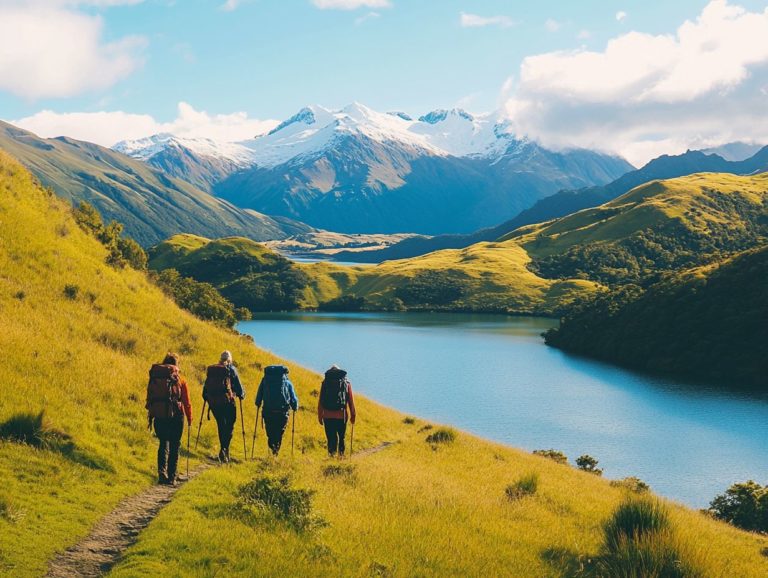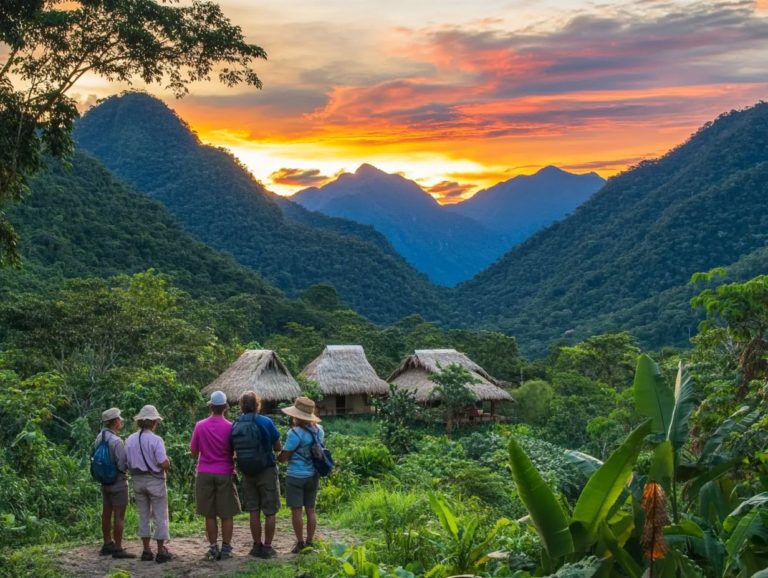5 Most Scenic Eco-Friendly Destinations
Searching for adventure while honoring the planet? You ve found just the right place.
This article shines a spotlight on five stunning eco-friendly destinations: Costa Rica, Iceland, New Zealand, Norway, and Bhutan. Each of these locations is beautiful and places a strong emphasis on sustainability.
Delve into what makes these places environmentally conscious and how you can embrace mindful travel. Discover the unique benefits and challenges that come with sustainable exploration, especially in the context of the climate crisis.
You can also uncover ways to support local communities and conservation efforts. Your next trip could truly make a difference!
Contents
- Key Takeaways:
- 1. Costa Rica
- 2. Iceland
- 3. New Zealand
- 4. Norway
- 5. Bhutan
- Why Choose Eco-Friendly Destinations?
- Frequently Asked Questions
- What are the top 5 most scenic eco-friendly destinations?
- What makes Costa Rica an eco-friendly destination?
- How does Norway prioritize eco-tourism?
- Why should I consider visiting New Zealand for an eco-friendly vacation?
- What unique eco-friendly experiences can I have in Iceland?
- What makes Bhutan a top eco-friendly destination?
Key Takeaways:
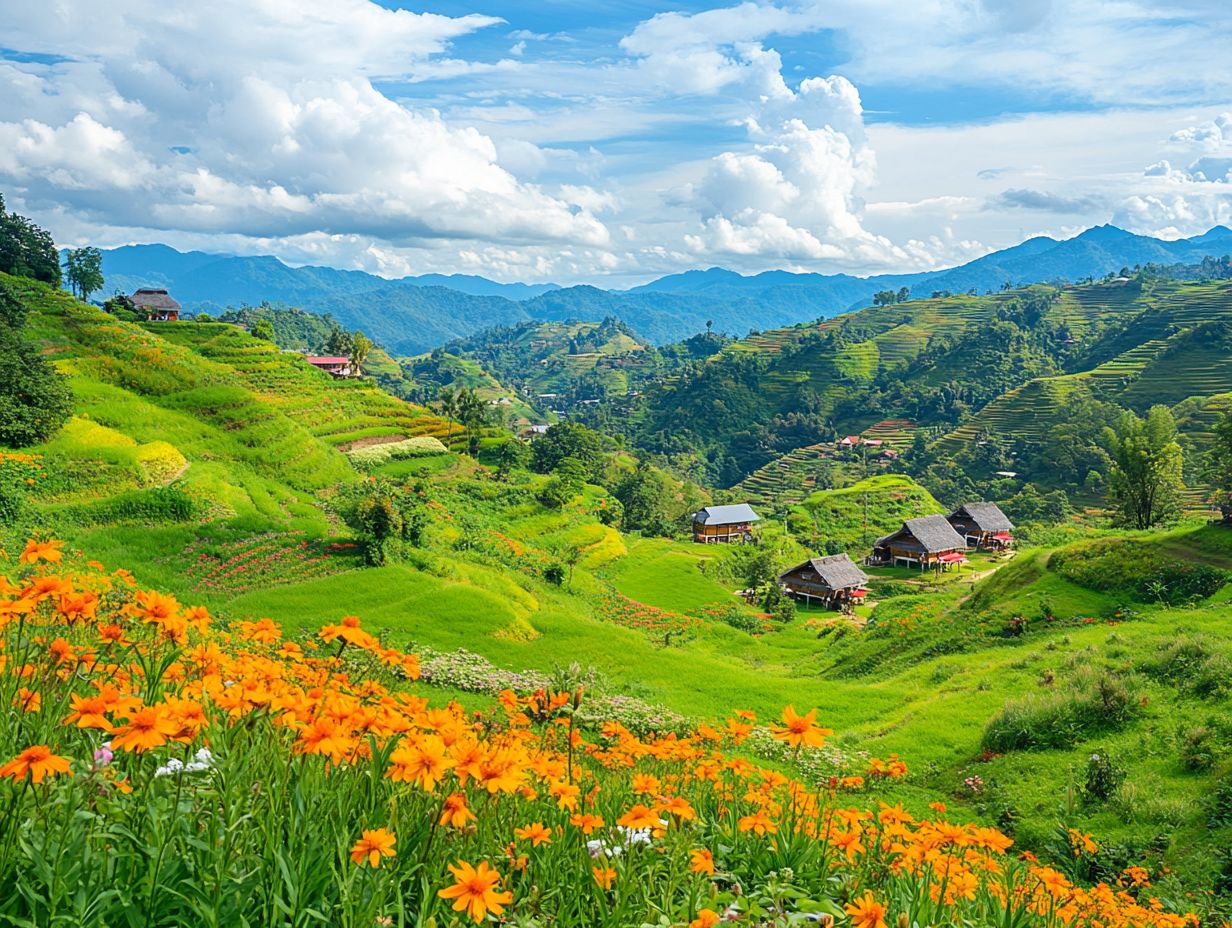
- Discover Costa Rica’s stunning nature and diversity!
- Explore Iceland’s breathtaking landscapes and geothermal wonders!
- Embark on a conservation journey in New Zealand!
1. Costa Rica
Costa Rica is not just another tropical getaway; it s your ultimate destination for sustainable travel in 2024. Eco-friendly practices and stunning beauty go hand in hand here, creating an environment that invites you to explore responsibly.
With a strong commitment to renewable energy and lush green spaces, Costa Rica stands out as a top choice for travelers who crave authentic experiences while minimizing the amount of carbon dioxide you produce.
From vibrant rainforests to breathtaking beaches, the country exemplifies how sustainable practices can be woven into daily life. You ll find eco-friendly accommodations and lively local markets.
The nation actively involves local communities in conservation efforts, ensuring that Indigenous cultures play a vital role in environmental stewardship.
Picture yourself in eco-lodges nestled deep in the jungle, thoughtfully designed to resonate with the region’s natural aesthetics while leaving a minimal environmental impact. Places like Manuel Antonio National Park showcase a commitment to preserving biodiversity and promoting sustainable tourism.
When you visit local markets, you ll find artisans and farmers proudly offering organic produce and handmade goods. These markets embody ecological principles, nurturing a sense of community and inspiring you to support local economies while embracing a sustainable lifestyle.
2. Iceland
Iceland stands as a remarkable example of sustainable travel. This island nation harnesses renewable sources to energize its vibrant communities while tackling the pressing challenges of the climate crisis.
As a traveler, you have the opportunity to explore stunning landscapes filled with geothermal springs and majestic waterfalls, all while supporting sustainable practices that protect the environment.
Iceland has made substantial investments in geothermal and hydroelectric energy, positioning itself as a global leader in clean energy. You can engage in activities such as hiking, whale watching, and visiting organic farms, all of which deepen your appreciation for the land.
These efforts underscore the importance of preserving Iceland’s unique natural landscapes, ensuring that future generations can enjoy the stunning beauty this country offers. By embracing sustainability, you not only enjoy enriching experiences but also play a meaningful role in the fight against climate change.
Plan your eco-adventure today and make a difference!
3. New Zealand
New Zealand positions itself as a leader in sustainable travel. The seamless integration of Indigenous cultures into eco-friendly initiatives reflects a profound respect for both nature and heritage.
Enjoy eco-friendly accommodations and public transport. Immerse yourself in breathtaking landscapes without leaving a significant carbon footprint.
This approach not only preserves the stunning environment but also enriches your experience. You ll learn about M ori traditions and customs along the way.
Regions like Rotorua and the Bay of Islands shine in their sustainability efforts. They offer accommodations that prioritize eco-consciousness while displaying Indigenous art and storytelling.
Public transport systems emphasize reduced emissions. They invite you to explore picturesque regions in harmony with conservation goals.
By embracing these principles, you can engage deeply with the land and its people. Foster connections that honor the rich cultural heritage beautifully intertwined with New Zealand s natural splendor.
4. Norway
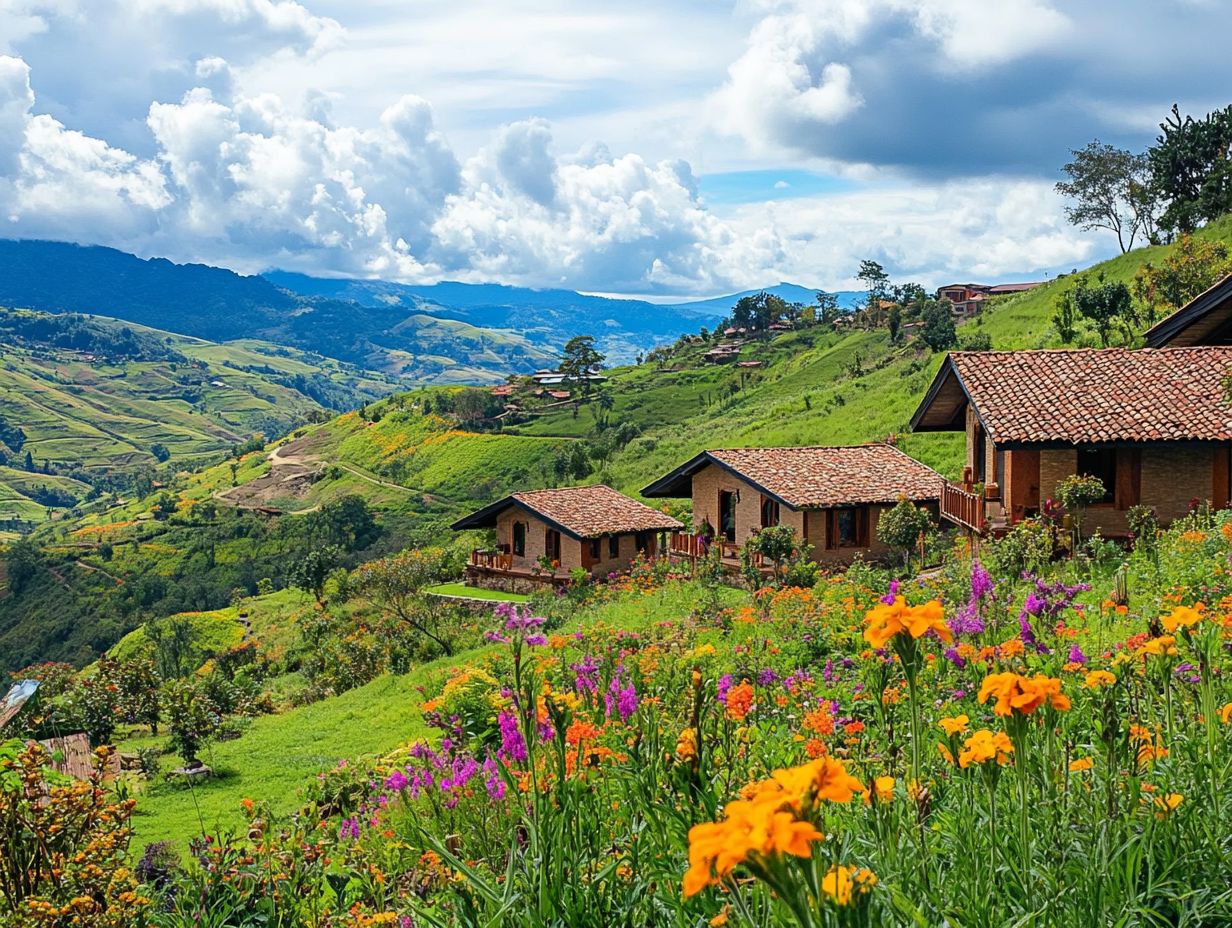
Norway is a great example of sustainable travel. Here, renewable resources and vast green spaces coexist with breathtaking landscapes and vibrant communities.
As you journey to this Scandinavian gem, you’ll discover a wealth of sustainable tourism options. From eco-friendly accommodations to scenic trails, you can minimize your carbon footprint.
The country has made remarkable progress in harnessing renewable energy. Over 98% of its electricity comes from hydropower, showcasing its strong commitment to eco-friendly practices.
You ll love relaxing at places like the sustainable Arctic Hotel, which features geothermal heating and emphasizes local sourcing.
Norway’s lush national parks, such as Jotunheimen and Rondane, provide advanced infrastructure for eco-conscious explorers. Enjoy electric bike rentals and guided tours that highlight the importance of conservation.
This collective effort to protect the environment enhances your travel experience. It also ensures a healthier planet for generations to come.
5. Bhutan
Bhutan is a standout destination in the world of sustainable travel. It places Gross National Happiness, a measure of the well-being of the country s citizens, above mere economic growth, while embracing practices that protect its rich cultural heritage and pristine natural environment.
As you explore, you ll find yourself surrounded by eco-conscious lodges and hotels. These places harness renewable energy, support local artisans, and display traditional architecture.
Bhutan actively engages in conservation initiatives to safeguard its diverse ecosystems. This includes creating wildlife corridors and promoting organic farming.
These efforts maintain Bhutan’s breathtaking landscapes. They also ensure that its unique culture flourishes within a sustainable tourism framework.
This allows you to experience a profound connection between the land and its people. Ultimately, Bhutan s harmonious blend of environmental stewardship and cultural integrity establishes it as a model for the future of travel.
Why Choose Eco-Friendly Destinations?
Choosing eco-friendly destinations is essential as a response to the climate crisis. By embracing tourism that protects the environment, you enhance your travel experience and help local communities.
When you visit these places, you enjoy breathtaking landscapes and rich cultures. You also support initiatives that promote sustainability and reduce your carbon footprint.
Take Costa Rica and Bhutan, for example. Both show how to preserve nature and strengthen local economies. Eco-lodges in Costa Rica blend seamlessly with the environment, supporting biodiversity conservation. In Bhutan, tourism is centered around the concept of Gross National Happiness, highlighting the benefits of sustainable practices. For those looking to explore more destinations, check out the top 10 eco-friendly travel spots for 2024.
By choosing to travel thoughtfully, you protect vital ecosystems and empower local communities. You pave the way for a more sustainable future.
What Makes a Destination Eco-Friendly?
An eco-friendly destination commits to sustainable practices. This includes using renewable resources, preserving green spaces, and promoting responsible tourism to minimize environmental impact.
These practices involve effective waste management, recycling programs, and reducing single-use plastics. Community involvement in wildlife protection and habitat restoration is also vital.
Consider Costa Rica, with its many protected areas fueling local economies, or Sweden, known for its public transport and renewable energy initiatives.
How Can Travelers Ensure They Are Being Environmentally Conscious?
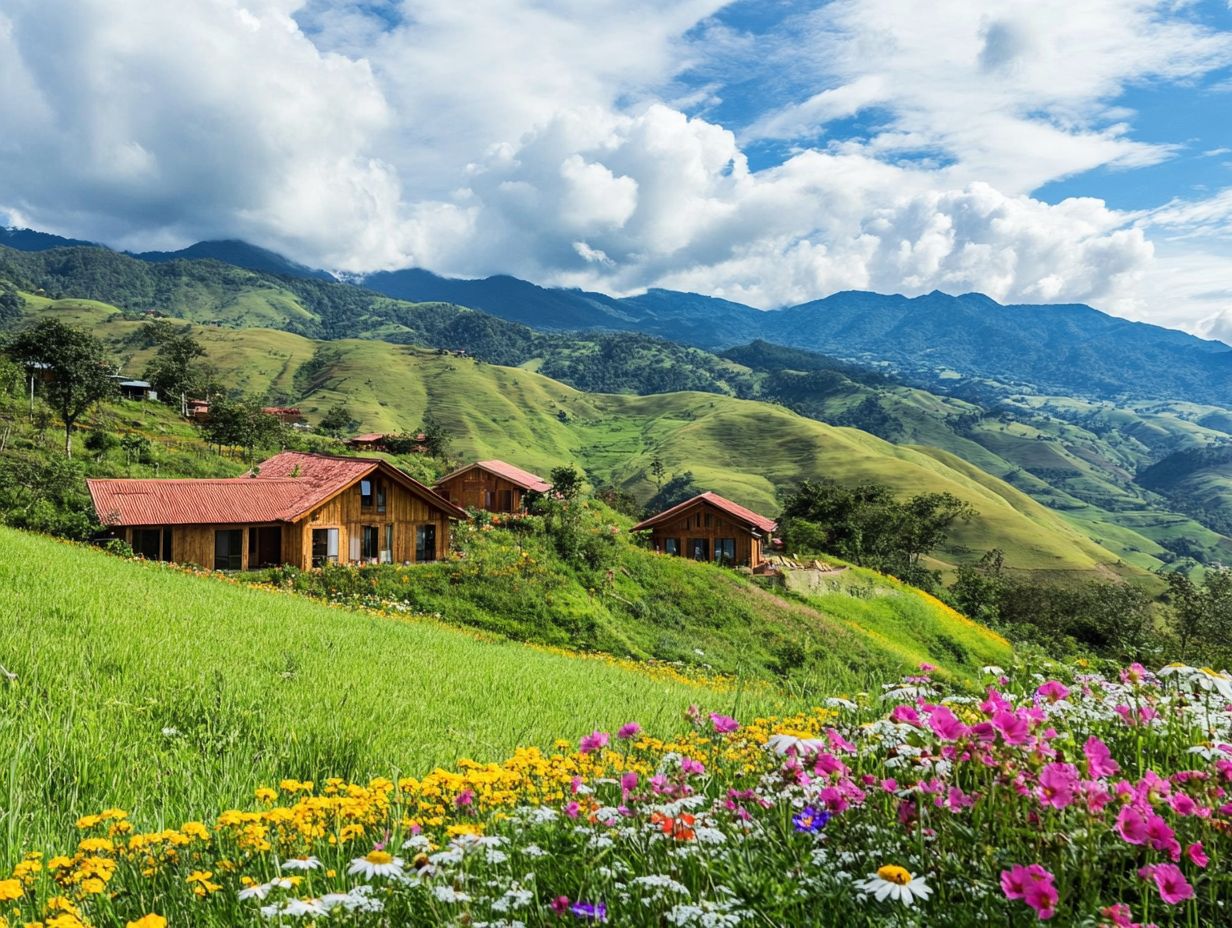
You can make your travels environmentally conscious by choosing eco-friendly options and using public transportation. Supporting local markets helps minimize your carbon footprint.
Select accommodations that prioritize green initiatives like solar energy and recycling programs. Choosing local eateries over large chains fosters community engagement and reduces waste from mass-produced food.
Packing light and using reusable items cut down on waste. Seek experiences that promote cultural exchange, letting you connect with locals while supporting their economies.
What Are the Advantages of Visiting Eco-Friendly Destinations?
Visiting eco-friendly destinations brings many benefits. You can immerse yourself in authentic local cultures, engage in sustainable tourism practices, and actively contribute to the protection of the environment and local economies.
By choosing eco-conscious travel, you support Indigenous cultures. You promote their rich traditions and crafts while helping maintain their ancestral lands and preserving the region’s remarkable biodiversity. Activities such as volunteering for local conservation projects and participating in cultural workshops enable you to forge meaningful connections with the community and foster a spirit of mutual respect.
Immersing yourself in nature, whether it’s hiking through pristine forests or kayaking in crystal-clear waters, greatly enhances your personal well-being. It significantly reduces stress and promotes mindfulness. For example, opting for eco-lodges that practice sustainable farming and support local artisans ensures that your travels leave a positive footprint on both the environment and the communities you visit. Consider exploring the best eco-friendly destinations for families for a more sustainable travel experience.
What Are the Challenges of Sustainable Travel?
Despite the many benefits of sustainable travel, navigating a landscape fraught with challenges can be difficult. The ongoing climate crisis looms large, and in some areas, infrastructure limitations can present hurdles. Balancing your desire to explore diverse destinations with the need to maintain a low carbon footprint, which means using less energy that harms the environment, can be tricky.
Economic pressures often weigh heavily, making it hard to prioritize sustainable choices. Eco-friendly accommodations and transportation options often come with a premium price tag. A lack of awareness can also pose a significant barrier; many travelers may not fully grasp the environmental and social ramifications of their travel decisions.
The influx of tourists can strain local communities, jeopardizing their traditional cultures and natural resources. To tackle these issues, consider taking proactive steps:
- Seek out educational resources
- Support local businesses
- Advocate for initiatives that promote responsible tourism
By doing so, you cultivate a more harmonious relationship between exploration and preservation, ensuring your travels contribute positively to the world around you.
How Can Travelers Support Local Communities and Conservation Efforts?
You have the power to support local communities and conservation efforts by choosing sustainable tourism options, shopping at local markets, and actively engaging in conservation initiatives during your travels.
By opting for community-based tourism experiences, you immerse yourself in authentic cultural exchanges that directly benefit residents. Volunteering with local organizations allows you to contribute your skills and services to conservation projects, enriching your travel experience even further.
Respecting local customs and traditions whether by participating in traditional ceremonies or learning a few phrases in the local language not only fosters goodwill but also deepens your connection to the places you visit. Such mindful practices create a ripple effect, promoting economic growth and environmental stewardship in the areas you explore.
Frequently Asked Questions

What are the top 5 most scenic eco-friendly destinations?
The top 5 most scenic eco-friendly destinations are Costa Rica, Norway, New Zealand, Iceland, and Bhutan.
What makes Costa Rica an eco-friendly destination?
Costa Rica is known for its commitment to sustainability and protecting its natural environment. It has a high percentage of protected land and a strong focus on green energy.
How does Norway prioritize eco-tourism?
Norway has strict regulations on preserving its natural beauty. This includes limiting the number of visitors to popular destinations and promoting sustainable transportation options.
Why should I consider visiting New Zealand for an eco-friendly vacation?
New Zealand has diverse landscapes, from lush rainforests to stunning mountains and beaches. The country has a strong focus on conservation and sustainable tourism practices.
Join us in making travel sustainable start planning your eco-friendly adventure today!
What unique eco-friendly experiences can I have in Iceland?
Imagine soaking in geothermal hot springs, surrounded by breathtaking volcanic landscapes. Don t miss the chance to witness the dazzling Northern Lights while supporting Iceland s green energy initiatives!
What makes Bhutan a top eco-friendly destination?
Bhutan stands out as a leader in eco-friendly travel! It is committed to preserving its natural environment and promotes sustainable development.
Bhutan measures success through a unique Gross National Happiness index, which includes environmental conservation as a key factor.



